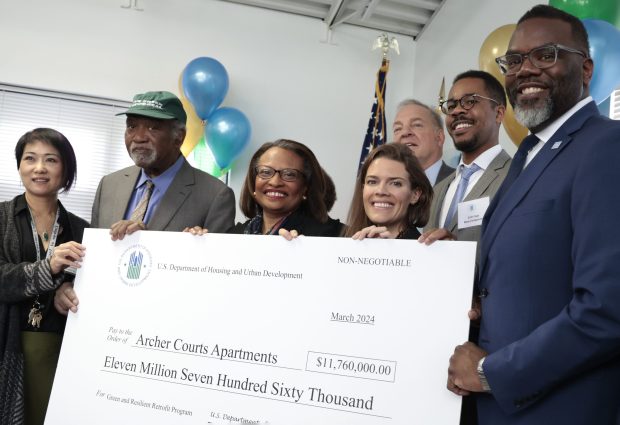Some renovation projects aimed at preserving and greening existing affordable housing properties are on hold in Chicago as the Trump administration evaluates a U.S. Department of Housing and Urban Development program.
Archer Courts in Chinatown, a 146-unit apartment building, was awarded over $11.7 million in federal funds for green energy fixes at an event a year ago with notable political officials, including then-acting HUD Secretary Adrianne Todman, HUD’s then-Midwest Director Jim Cunningham, Mayor Brandon Johnson and Chicago Department of Housing Commissioner Lissette Castañeda.
Now, the redevelopment is in jeopardy.
“It’s very likely that on this particular project, we will not be able to make any additional investments in the property beyond what we have already made,” without the HUD grant, said Lauren Zullo, managing director of impact for New York-based developer Jonathan Rose Companies.
The more than $1 billion national program, known as the Green and Resilient Retrofit Program, is funded through the 2022 Inflation Reduction Act and provides developers with one piece of the complex and expensive capital stack required to complete affordable housing projects. The Associated Press first reported the threat to the national HUD program. About 270 projects were awarded funds, with at least 15 of these projects in Illinois — in various stages of development. The Illinois developments are slated to receive over $52.5 million, with some still forging ahead.
“The previous administration’s energy efficiency crusade diverted valuable resources, including funding, from the department’s mission,” said Kasey Lovett, a HUD spokesperson, in a statement to the Tribune. “The department is evaluating options to ensure rural, tribal and urban communities have the resources they need, which are not solar panels.” HUD did not answer the Tribune’s specific questions about the program.
The news comes as the city and country are grappling with how to address a severe shortage of affordable housing as housing costs have skyrocketed in recent years and could potentially increase more with President Donald Trump’s recently imposed and anticipated tariffs. The redevelopment projects aided by HUD dollars would help extend the lifetime of hundreds of affordable housing units in Illinois.
HUD is also undergoing scrutiny in other areas and faces cuts from Trump and billionaire Tesla owner Elon Musk’s Department of Government Efficiency in the Midwest region and at the national level.
Eight Chicago-based U.S. Department of Housing and Urban Development staffers with more than 180 years of service collectively have retired or are retiring later this year as the agency undergoes scrutiny.
At least 20 local HUD workers lost their jobs or received layoff notices last month; some of these employees have since been placed on administrative leave following court orders. A dozen of these employees work in the local HUD Office of Field Policy and Management, which will wipe out the entire local department, apart from managers. Chicago-area housing organizations are also facing funding cuts from HUD, with some recently receiving termination notices for grants while others are in limbo as they wait for overdue contracts or to see what happens with expected awards. (A judge temporarily blocked the Trump administration from terminating the grants in a ruling Tuesday.)
The renovation at Archer Courts was to be aided by a HUD-hired consultant who was conducting studies to create development plans. That consultant’s contract has now been terminated, Zullo said, and her company does not have a way to move forward on the project without that assistance. The work would include updates to aging building heating and hot water systems.
And, Zullo said, the loss of this rehab project would also mean the loss of local jobs and disappointment for the building’s residents.
A Chicago Department of Housing spokesperson said in a statement to the Tribune that it has “several critical projects in its pipeline that are currently dependent on these funds.”
“While we are reviewing the impact of HUD’s actions, it is deeply disappointing that our residents could be the ones most impacted,” the statement said.
Brainerd Senior Center, a 60-unit, $14.5 million rehab project on the Far South Side aimed at decarbonization, was awarded a $750,000 HUD loan. It is in the “group of a lucky few” that are more likely to receive their funding because the deal has already closed and construction has started, said Lindsey Haines, executive vice president of real estate development at Full Circle Communities, a Chicago-based nonprofit affordable housing developer.
Haines said her group is still “very nervous” about receiving the funds and has not heard anything directly from HUD.
“Any funding we need to put out the door to fill in a gap from funding we were counting on puts our ability to do our core mission at risk,” Haines said.

The Preservation of Affordable Housing, a national housing developer, has three projects in Chicago in various stages of redevelopment that were awarded HUD funds.
The $117 million rehab for the 240-unit Island Terrace Apartments in the Woodlawn neighborhood — whose HUD grant was put toward upgrading to a more energy efficient heating system — is completed and POAH has requested reimbursement for the $750,000 grant from HUD, said Bill Eager, senior vice president of real estate development for the Midwest region of POAH and who is based in Chicago.
Eager said his company is going through the normal requisition process and has not yet heard from HUD.
“We are hopeful that money will come through,” Eager said.
The other two projects, Corcoran Place and Austin Renaissance, both in the Austin neighborhood and awarded funds of about $5.6 million each, are on hold as the developer awaits word from HUD, Eager said. The New York Times first reported the Corcoran Place project’s status.
Corcoran Place, a 94-unit apartment building for older adults, is supposed to receive green upgrades, including an improved HVAC system, under its $39.5 million renovation. The deal was expected to close in a couple of months, Eager said. Austin Renaissance, a 71-unit complex for families, is still in the early stages of its $33.9 million redevelopment plans.
Eager said that while the GRRP funds are for energy retrofits, the dollars “unlocked an ability to do a substantial rehab” to “improve the quality of life” for residents at properties like Corcoran Place and Austin Renaissance.
“Yes, we don’t want to lose our deals, but this stuff really affects people’s everyday lives,” Eager said. “We may not be able to preserve and revitalize these properties” without the GRRP funds.





